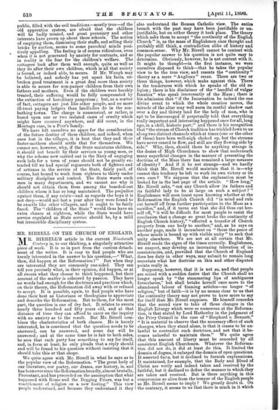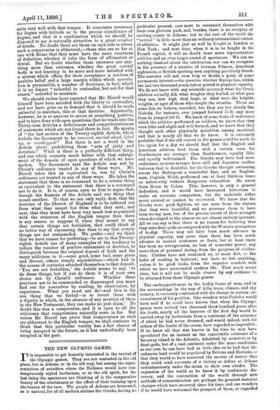MR. BIRRELL ON THE CHURCH OF ENGLAND.
MR. BIRRELL'S article in the current Nineteenth Century is, to our thinking, a singularly attractive piece of work. It is so in part from the curious detach- ment of the writer. It is easy to find people who are keenly interested in the answer to his question,—" What, then, did happen at the Reformation ?" But when they are interested they are commonly one-sided. They can tell you precisely what, in their opinion, did happen, or at all events what they choose to think happened, but their account of the matter is coloured by passion. They have no words bad enough for the doctrines and practices which, on their theory, the Reformation did away with or refused to accept. It is possible, again, to find people who have done their best as historians or theologians to appreciate and describe the Reformation. Bat to them, for the most part, the question is one of dry fact. It relates to events nearly three hundred and fifty years old, and at that distance of time they can afford to carry on the inquiry with no anxiety as to the result. But Mr. Birrell com- bines the characteristics of both classes. He is keenly interested, he is convinced that the question needs to be answered, can be answered, and some day will be answered ; and at the same time he is fair to both sides, he sees that each party has something to say for itself, and, in form at least, he only pleads that a reply should and will be found to his question without insisting that it should take this or that shape.
We quite agree with Mr. Birrell in what he says as to the popular view of the Reformation. "The great body of our literature, our poetry, our drama, our history, is, and has been ever since the Reformation broadly, almost brutally, Protestant, and has proceeded on the assumption that what happened with Rome and the Begging Friars, was but a resettlement of religion on a new footing." This view people understand, and because they understand it they also understand the Roman Catholic view. The entire breach with the past may have been justifiable or un- justifiable, but on either theory it took place. The theory which asks them to accept "the continuity of the English Church" is, as the mass of Englishmen once thought and probably still think, a contradiction alike of history and common-sense. Why Mr. Birrell cannot be content with the popular answer to his question is not quite easy to determine. Obviously, however, he is not content with it. It might be thought—in the first instance, we were ourselves disposed to think—that he takes the popular view to be the true view, and resents the " continuity " theory as a mere "Anglican" craze. There are two or three things, however, which make against this. There is the tenderness with which he speaks of the old re- ligion; there is his disclaimer of the "handful of vulgar fanatics" who speak irreverently of the Mass ; there is his admission that "if the Incarnation be indeed the one divine event to which the whole creation moves, the miracle of the altar may well seem its restful shadow cast over a dry and thirsty land for the help of man, who is apt to be discouraged if perpetually told that everything really important and interesting happened once for all, long ago, in a chill, historic past;" and there is his recognition that "the stream of Church tradition has trickled down to us along two distinct channels which at times (one or the other of them) have been well-nigh choked up, but the streams have never ceased to flow, and still are they flowing side by side." Why, then, should there be anything strange in the desire of High Churchmen to show that underneath many superficial changes in the manner of presenting the doctrine of the Mass there has remained a large measure of identity ? And if it be not strange—and we hardly think that Mr. Birrell would maintain that it is—why cannot this tendency be left to work its own victory or its own cure ? We suppose that the explanation must be looked for in the last page of the article. "How long," Mr. Birrell asks, "can any Church allow its fathers and its faithful lady to be at large on such a subject ? " Englishmen will soon insist upon knowing whether at the Reformation the English Church did "in mind and rule cut herself off from further participation in the Mass as a sacrifice," and, if it turns out that she did thus cut her- self off, "it will be difficult for most people to resist the conclusion that a change so great broke the continuity of English Church history," "effected a transfer of Church property from one body to another," and, as he says on another page, made it incumbent on "those the peace of whose minds is bound up with visible unity" to seek that unity elsewhere. We are not at all certain that Mr. Birrell reads the signs of the times correctly. Englishmen, we suspect, may develop an increasing toleration of in- consistencies, and, provided that the Church of England does her duty in other ways, may submit to remain long uncertain what her doctrine on this and other disputed points really is. Supposing, however, that it is not so, and that people are seized with a sudden desire that the Church shall no longer speak by "the stammering lips of ambiguous formularies," but shall betake herself once more to the abandoned labour of framing articles—no longer "of religion," but of faith—it is by no means clear to us that the continuity theory may not prove to have more to say for itself than Mr. Birrell supposes. He himself concedes that the sound view to take of those changes in the English Liturgy which were so numerous at the Reforma- tion, is that stated by Lord Hatherley in the judgment of the Privy Council in the case of "Shepherd v. Bennett." "It is material to observe that the necessary effect of such changes, when they stand alone, is that it ceases to be un- lawful to contradict such doctrines, and not that it be- comes unlawful to maintain them." We quite agree that this amount of liberty must be conceded by all consistent English Churchmen. Whatever the Reforma- tion did not do, it did at least do this. It limited the domain of dogma, it enlarged the domain of open questions. It asserted facts, but it declined to furnish explanations. It maintained, for example, that the Body and Blood of Christ are verily and indeed taken and received by the faithful, but it declined to define the manner in which they are taken and received. But is there anything in this compromise so alien from the temper of the English people as Mr. Birrell seems to imply ? We greatly doubt it. On the contrary, it seems to us that there is much in it which suits very well with that temper. It associates reverence for dogma with latitude as to the precise significance of dogma, and that is a combination which we should be disposed to say is naturally attractive to a great number of minds. No doubt there are those on each side to whom such a compromise is abhorrent,—those who are so far at one with Rome that they must have the same exactness of definition, whether it take the form of affirmation or denial. But we doubt whether these extremes are any- thing more than extremes, whether the great central body is not learning to be more and more satisfied with a system which offers for their acceptance a nucleus of positive belief and a large margin within which specula- tion is permissible, a number of doctrines, in fact, which it is no longer "unlawful to contradict, but not for that reason" unlawful to maintain.
We should rather have expected that Mr. Birrell would himself have been satisfied with the liberty to contradict, and not have gone on to demand that it should be made unlawful to maintain, this or that doctrine. Apparently, however, he is so anxious to arrive at something positive, and to have done with open questions, that he reads into the Thirty-nine Articles a definiteness and comprehensiveness of statement which are not found there in fact. He speaks of "the last section of the Twenty-eighth Article, which forbids the Sacrament to be reserved, carried about, lifted up, or worshipped." But there is not a word in the Article about prohibiting these "acts of piety and devotion." What is there is a perfectly different thing, and one which consorts much better with that enlarge- ment of the domain of open questions of which we have spoken. The Sacrament says the Article was not by Christ's ordinance treated in any of these ways. Mr. Birrell takes this as equivalent to, was by Christ's ordinance ttot treated in any of these ways. He takes the statement that there is no command to do a certain thing as equivalent to the statement that there is a command not to do it. It is, of course, open to him to argue that, though the framers of the Article said one thing they meant another. To that we can only reply, first, that the doctrine of the Church of England is to be inferred not from what they meant but from what they said ; and next, that they must have been very much less acquainted with the resources of the English tongue than there is any reason to suppose if, when they meant to say that certain things are forbidden, they could think of no better way of expressing this than to say that certain things are not commanded. We prefer—and we think that we have reason for preferring—to see in this Twenty- eighth Article one of many examples of the tendency to reduce the number of positive statements of doctrine, to distinguish between the original deposit of faith and the many additions to it—some good, some bad, some pious and devout, others simply superstitious—which had in the course of centuries attached themselves to that deposit. 'You are not forbidden,' the Article seems to say, to do these things, but if you do them it is of your own choice not by Christ's ordinance. Whether these practices are to be commended or discouraged you must find out for yourselves by reading, by observation, by experience. What you must not do—and this is the one thing that we forbid—is to invest them with a dignity to which, in the absence of any mention of them in the New Testament, they can make no just claim.' No doubt this was a compromise, and it is open to all the criticisms that compromises naturally come in for. But unless Mr. Birrell can prove that compromises as such are abhorrent to the English temper, we shall continue to think that this particular variety has a fair chance of being accepted in the future, as it has undoubtedly been accepted in the past.



































 Previous page
Previous page